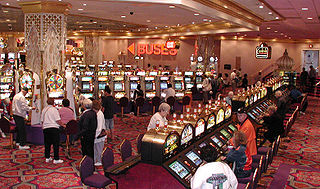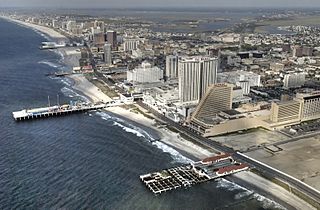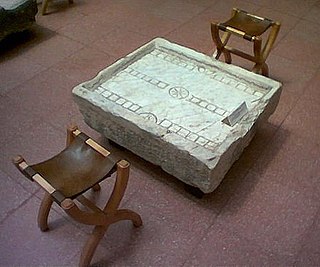
Native American gaming comprises casinos, bingo halls, and other gambling operations on Indian reservations or other tribal lands in the United States. Because these areas have tribal sovereignty, states have limited ability to forbid gambling there, as codified by the Indian Gaming Regulatory Act of 1988. As of 2011, there were 460 gambling operations run by 240 tribes, with a total annual revenue of $27 billion.
Loto-Québec is a provincial crown corporation mandated to "conduct and administer lottery schemes and to operate businesses which are incidental to the operation of a State casino" in the Canadian province of Quebec.
Online gambling is any kind of gambling conducted on the internet. This includes virtual poker, casinos and sports betting. The first online gambling venue opened to the general public, was ticketing for the Liechtenstein International Lottery in October 1994. Today the market is worth around $40 billion globally each year, according to various estimates.

The Indian Gaming Regulatory Act is a 1988 United States federal law that establishes the jurisdictional framework that governs Indian gaming. There was no federal gaming structure before this act. The stated purposes of the act include providing a legislative basis for the operation/regulation of Indian gaming, protecting gaming as a means of generating revenue for the tribes, encouraging economic development of these tribes, and protecting the enterprises from negative influences. The law established the National Indian Gaming Commission and gave it a regulatory mandate. The law also delegated new authority to the U.S. Department of the Interior and created new federal offenses, giving the U.S. Department of Justice authority to prosecute them.

Gambling in the United States is legally restricted. In 2008, gambling activities generated gross revenues of $92.27 billion in the United States.
A gaming control board (GCB), also called by various names including gambling control board, casino control board, gambling board, and gaming commission, is a government agency charged with regulating casino and other types of gaming in a defined geographical area, usually a state, and of enforcing gaming law in general.

The British Columbia Lottery Corporation is a Canadian Crown corporation offering a range of gambling products including lottery tickets, casinos and legal online gambling. It is based in Kamloops, with a secondary office in Vancouver. It consists of three business units, Lottery, Casino and eGaming; and five support divisions, Human Resources, Information Technology, Compliance & Security, Finance, and Communications. Its annual revenues exceed CDN $3.1 billion. It has 890 direct employees. Its service providers, who run casinos on its behalf under contract, have an additional 8,300 employees.
Gambling in India varies by state as states in India are entitled to formulate their own laws for gambling activities. Some states like Goa have legalised casinos. Common gambling activities like organized betting is restricted except for selective categories including lottery and horse racing.

The Gambling Commission is an executive non-departmental public body of the Government of the United Kingdom responsible for regulating gambling and supervising gaming law in Great Britain. Its remit covers arcades, betting, bingo, casinos, slot machines and lotteries, as well as remote gambling, but not spread betting. Free prize competitions and draws are free of the Commission’s control under the "Gambling Act 2005"
Gambling in South Africa has been heavily restricted since 1673, with South Africa's Gambling Act of 1965 officially banning all forms of gambling except betting on horse racing which existed as a sporting activity.
Gambling in Pennsylvania includes casino gambling, the Pennsylvania Lottery, horse racing, Bingo, and small games of chance conducted by nonprofit organizations and taverns under limited circumstances. Although casinos gaming has only been legal for about a decade, Pennsylvania is second only to Nevada in commercial casino revenues.

Gambling in New Jersey includes casino gambling in Atlantic City, the New Jersey Lottery, horse racing, off-track betting, charity gambling, amusement games, and social gambling. New Jersey's gambling laws are among the least restrictive in the United States. In 2013, the state began to allow in-state online gambling. Five years later, the state won a lawsuit that dismantled Nevada's monopoly on legal sports betting.

Gambling in Italy has existed for centuries and has taken on many forms. Its dates back to the days of the Roman Empire, when the predecessor of the modern game of backgammon, Ludus Duodecim Scriptorum, became popular among Roman legionnaires. It is also due to them that the game came to other European countries.
Legal forms of gambling in the U.S. state of North Carolina include the North Carolina Education Lottery, three Indian casinos, charitable bingo and raffles, and low-stakes "beach bingo". North Carolina has long resisted expansion of gambling, owing to its conservative Bible Belt culture.
Legal forms of gambling in the U.S. state of Texas include the Texas Lottery; parimutuel wagering on horse and greyhound racing; charitable bingo, pull-tabs, and raffles; and three Indian casinos.
Legal forms of gambling in the U.S. state of Massachusetts include casinos, parimutuel wagering on horse racing, the Massachusetts Lottery, and charitable gaming. The Massachusetts Gaming Commission regulates commercial operations under state jurisdiction.

The Michigan Gaming Control Board (MGCB) is a gaming control board in Michigan that provides oversight of the state's gaming industry, which was founded and authorized by statewide voting in November 1996.

Legal forms of gambling in the U.S. state of California include cardrooms, Indian casinos, the California State Lottery, parimutuel wagering on horse racing, and charitable gaming. Commercial casino-style gaming is prohibited.
Legal forms of gambling in the U.S. state of Maine include parimutuel wagering on horse races, the Maine Lottery, two casinos, and charitable gaming.
Legal forms of gambling in the U.S. state of Connecticut include two Indian casinos, parimutuel wagering, charitable gaming, the Connecticut Lottery, and sports betting.








